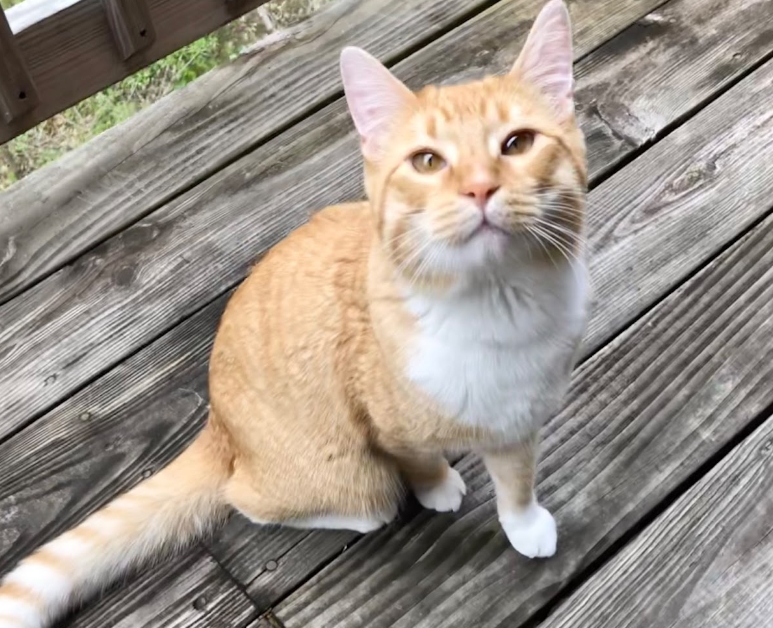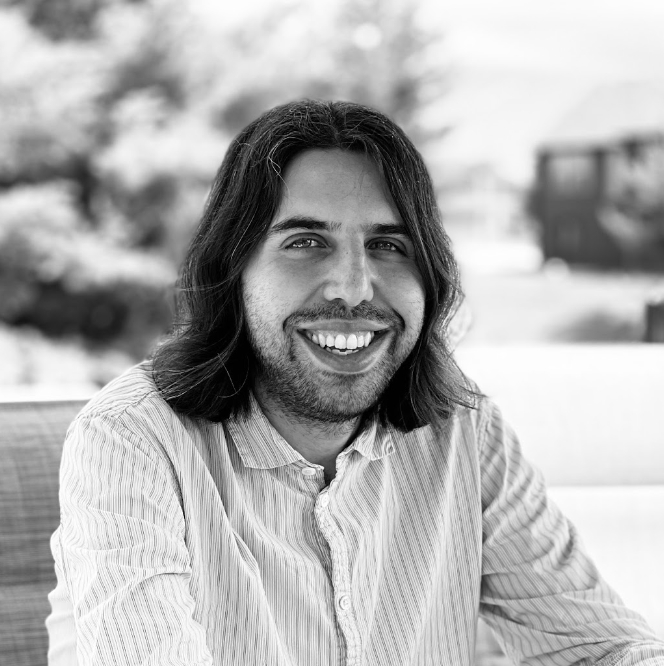Contents
Hello! Who are you?
I’m Francisco Luna and I live in my hometown of Kansas City. I am currently interviewing for professional positions after several years of not working full-time due to mental health issues. I was teaching chess part-time but stopped in late 2021 to focus on writing a memoir.
Prior to my struggle with mental health, I had a film company which I started as an MBA student after Werner Herzog encouraged me to make a film. I recently finished a new screenplay and it is a long-term goal of mine to make films again.
In January, I started dating for the first time in years. It has been going well and I have enjoyed meeting new people. I have a cat, Hemingway, whom I adopted after he showed up hungry and cold at my mom’s door in 2019. My passions include literature, music (mostly classical), cinema, and effective altruism, which measures the number of lives saved per dollar of charitable giving.
I am generally happy these days. My life is both pleasant and fulfilling, with new opportunities opening up and giving me hope for an even better future.
What is your struggle and when did it start?
I am diagnosed with Delusional Disorder, which is a form of psychosis, although I have not had symptoms since starting medication in 2016.
During the course of my illness, I experienced symptoms characteristic of psychosis, which the NIH lists as, “some loss of contact with reality…difficulty understanding what is real and what is not…delusions…hallucinations…incoherent or nonsense speech…behavior that is inappropriate for a situation.”
The onset of symptoms occurred when I was a 26-year-old MBA student, not long after I started my company. This type of disorder is familial (my Great Aunt has a related disorder) and it is not uncommon for the onset to occur in a person’s mid-twenties.
However, stress can bring on symptoms for those disposed to psychosis, and the combined stress from my job, MBA classes, and the launch of my company may have contributed to the onset of the disorder.
At first, I was rather paranoid and convinced that criminals were drugging me and otherwise out to harm me. Like many people suffering from delusions, I did not believe anything was wrong with me and refused treatment.
Eventually, I was unable to provide for myself and moved in with my family outside of the city. The peaceful environment seemed to quell my paranoia, but over the next few years, my delusions took on a religious character. This led me to extreme fasting, which put me in the hospital and allowed the county where I live to take legal guardianship of me. This is similar to the legal conservatorship made famous by Britney Spears.
I was then forced to live for five months in a lock-down mental healthcare facility where I was given forced injections to treat my psychosis. Within six months my symptoms had disappeared and seven years later I have not had a single relapse.
How did this struggle make you feel at your worst moments?
My struggle with psychosis had a profound impact on my happiness. As my medication took effect and my delusions faded, I became acutely aware that my life was in shambles. I felt like my life was over and that I would never be able to accomplish my goals in business or as a filmmaker. I thought no one would ever want to date a crazy person.
While I was in the mental healthcare facility, I began thinking of ways to commit suicide. I kept this to myself and was released from the facility after five months. I was on a very high antipsychotic dose and the side effects made me miserable.
I made a plan to end my life but before anything happened my mom noticed my deepening depression. She helped me get treatment for depression and, just as important, both she and my brother spent time with me, offering constant reassurance that there was light at the end of the tunnel.
👉 Share your story: Help thousands of people around the world by sharing your own story. We would love to publish your interview and have a positive impact on the world together. Learn more here.
Was there a moment when you started to turn things around?
For several years I took an antidepressant. Because the county was my guardian, the circumstances causing my depression were out of my control and there was nothing I could do to improve my quality of life.
Over time, however, the situation slowly improved. The medicine that treated my psychosis was gradually lowered to the lowest dose and the side effects that made my life so miserable disappeared.
After completing a three-year program, I was able to end the guardianship, which gave me back my freedom. Feeling better about life and no longer suicidal, I tapered off the anti-depressant as well.
What steps did you take to overcome your struggle?
For both the psychosis and depression that I experienced, medication played the biggest role in my initial improvement. I might not be alive today if it were not for the medications that treat these conditions.
However, being overmedicated with an antipsychotic dose that was too high contributed greatly to my depression. If I could go back and change something, it would be to have tried a low-dose antipsychotic at the initial onset of my psychosis.
If I had done so, it is possible that I would have been able to continue my life with minimal interruption. It was only because I waited so long (four years) to be treated that I ended up under legal guardianship. Then, because of the guardianship, I was forced to take a debilitatingly high antipsychotic dose for another four years.
Although I did not love taking an antidepressant, I now recognize that they can be very helpful. If you find yourself in a situation where nothing you do, or can do given current circumstances, is improving your depression, an antidepressant can help. In my case, it helped me to appreciate the remaining good things in my life and also to get back on my feet.
I must say that I found exercising to be helpful as well. In my depression, I was skeptical that it would make such a big difference, but I gradually worked my exercise routine up from zero to four days per week and it has noticeably boosted my mood.
Finally, interacting with others has been very important to me. At first, I was so ashamed of my situation that I mainly just interacted with my family. They were a big help, but as I became more confident I started making new friends (I joined a French language group, for example).
Humans are social creatures and I have found that forming new relationships has greatly increased my satisfaction in life. Having a friendly pet doesn’t hurt either!

Have you shared any of this with people around you in real life?
In my personal life, I am most comfortable talking with my family about my mental health. But not every family member knows every facet of what I experienced. I wrote a memoir about it and am now seeking a literary agent in order to get it published. Once it is released, my family members will likely read things about my experience that they did not know before.
I have told some old friends about what happened to me because I felt like I owed them an explanation for my odd behavior over the years. Most everyone was understanding and supportive, though some people whom I hadn’t spoken to in a while never replied to me.
When I meet new people, I do not tell them about my struggle right away. It was by and far the worst thing that ever happened to me and I don’t like to introduce myself with that story.
But as I get to know someone, I gradually share more details. Usually, I introduce the topic by vaguely saying that I had an illness or some health issues. Although ‘Francisco’ is my first name, I have always gone by a shorter, Americanized name. I introduce myself to new people with this shorter name with the result that people do not immediately identify me with my public writing about mental illness. If someone is really interested, they can figure it out, but in general, this has provided me with a buffer between my mental health struggle/writing and my personal relationships.
If you could give a single piece of advice to someone else that struggles, what would that be?
Many people experiencing symptoms of psychosis do not recognize them as such. If you ever find yourself in a situation where the people who love you are suggesting that you ought to see a psychiatrist, I would say go. If the psychiatrist prescribes an antipsychotic, I would urge you to try it for at least six months. That is about how long it took for me to see my previous delusions for what they were.
If you try an antipsychotic and recognize that you were having symptoms of psychosis, keep taking the medicine. If you lower it, or possibly even discontinue it, do it according to a gradual plan that you make with your psychiatrist.
If you just stop taking it, you will likely relapse with the possibility that the medication will no longer work for you. Taking an antipsychotic early on could be the difference between long-term or even permanent disability and living your life almost as it was before the onset of symptoms.
What have been the most influential books, podcasts, YouTube channels, or other resources for you?
- Overthinking About You: Navigating Romantic Relationships When You Have Anxiety, OCD, and/or Depression: Although this book is aimed at people with very specific mental health issues, there is a chapter in it about how to discuss mental health with a romantic partner. I found this very helpful to read before I started dating, as I wasn’t sure when and how to broach the topic of my mental health diagnosis. The idea is basically not to bring it up immediately, and not to overwhelm the person with too much information all at once. Also, framing the struggle in terms of how it helped you to grow. I would recommend the book for this chapter, and I imagine many people find value in the other chapters as well.
- “Philosophy can help us connect, even in the face of psychosis”: This article was very moving to me. I had never read anything that explained so well how it felt to experience psychosis. I also thought that the authors’ suggestions as to how to treat and relate to people with psychosis would have helped me, and perhaps caused me to accept treatment earlier.
- One of the article’s authors, Rosa Ritunnano, is active on Twitter. She often shares helpful information (though some of it is a bit technical and aimed at academic or mental health professionals).
Where can we go to learn more about you?
You can find me over at my website or on Twitter!
Want more interviews?
Continue reading our inspiring case studies and learn how to overcome mental health struggles in a positive way!
Want to help others with your story? We would love to publish your interview and have a positive impact on the world together. Learn more here.

